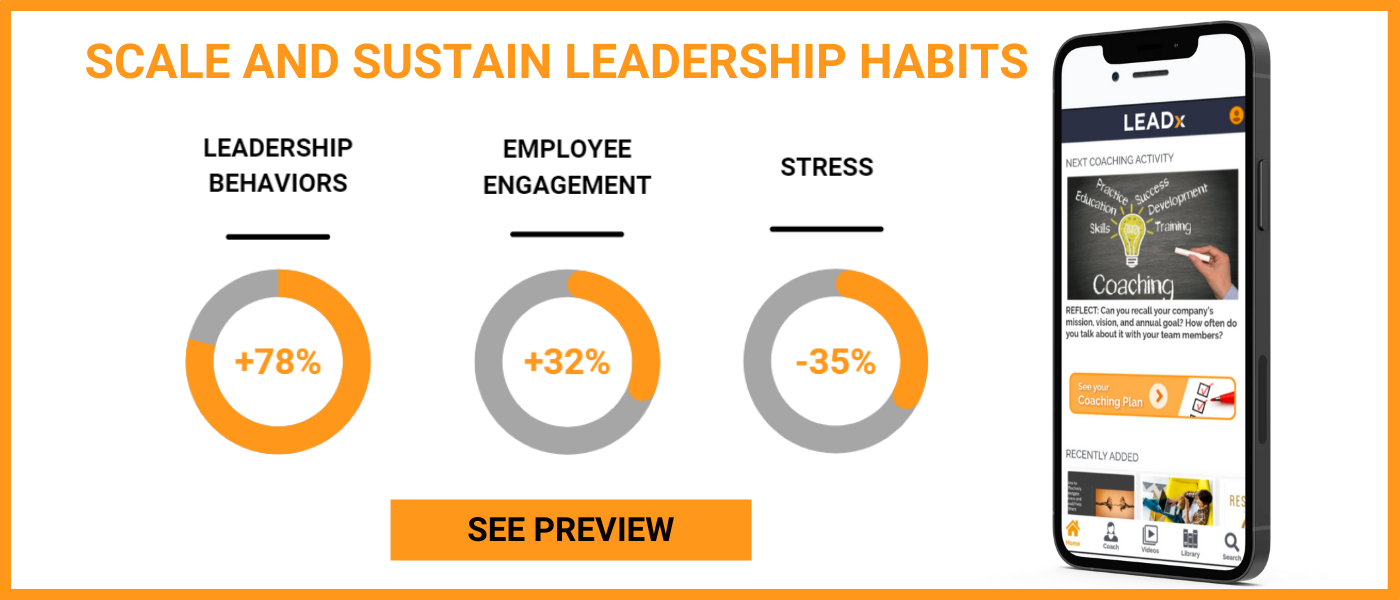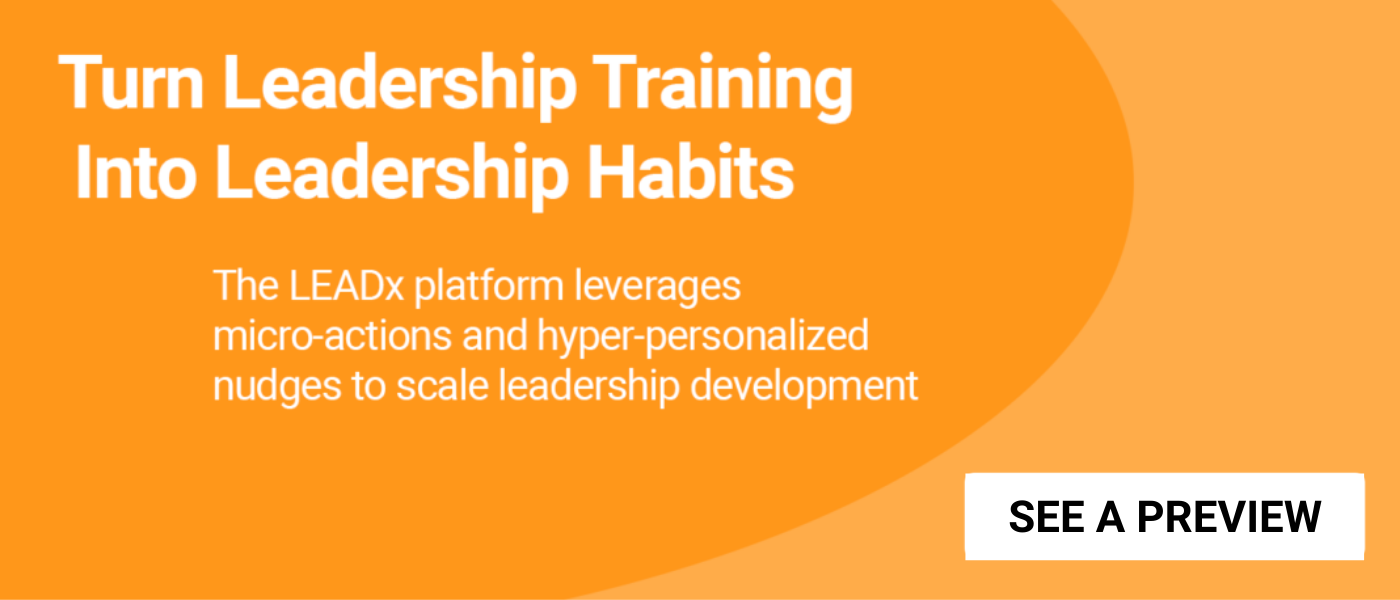
I speak to hundreds of leadership development professionals each year. The best ones all seem to have something in common: Through challenges and times of change, they don’t just survive, they find a way to thrive.
I had the chance to interview Kristy Callahan, who was the senior director of commercial training & development at a large medical device company. She came on board about three years ago at the outset of COVID. Her sales reps, like most medical device sales reps at the time, were struggling to sell due to the challenges with access to customers.
 Callahan and her team not only found a way to deliver highly relevant training to their sales leaders and sales reps, but they also capitalized on the moment of change to rethink and redesign their entire approach. Within a couple of years, they moved their training from more passive to more directional, from an archival resource to a system of behavior change. Here’s how she did it.
Callahan and her team not only found a way to deliver highly relevant training to their sales leaders and sales reps, but they also capitalized on the moment of change to rethink and redesign their entire approach. Within a couple of years, they moved their training from more passive to more directional, from an archival resource to a system of behavior change. Here’s how she did it.

Content Libraries Lacked Clear Direction and Overwhelmed Busy Sales Leaders
Leaders would have access to some 300 pieces of content,” Callahan said, “And they kept saying, “It's just too much.” —Kristy Callahan, Sr. Director Commercial Training & Development
At the very outset of COVID, Callahan and her team were primarily using a learning library where learners could select lessons and videos and work at their own pace.
Initially, this worked well. With work-from-home mandates in place, people had the time to work at their own pace. Engagement rates were high regardless of what learning they pushed out. But, as more time passed, Callahan could tell engagement was slipping. She said, “People would look at the content, but the whole ‘here’s the well, come and drink,’ just didn’t work.”
Considering how busy sales reps and sales leaders are, too many options worked against them. “Leaders would have access to some 300 pieces of content,” Callahan said, “And they kept saying, ‘It's just too much.’ The content library would also push out notifications about things that aren't relevant to them. These notifications became noise, and learners ignored them.”
Callahan Used Micro-Learning and Nudges to Make Learning More Personal and Directional
We wanted something that was personalized, bite-size, and in the flow of work. —Kristy Callahan, Sr. Director Commercial Training & Development
Callahan’s solution was to put together a training program that was more personalized and directional. She wanted something that would help “break the normal way learners do things.” She said, “We wanted something that was personalized, bite-size, and in the flow of work.”
“Instead of a content library,” Callahan said, “we decided to leverage a platform that's more directional. What I mean is that everything you could imagine is still available, like it is in a library format, but you don't see everything at once. The content that you need is delivered to you at the right time in your training.”
To pilot the new platform, Callahan built out a 12-week plan where 25 sales leaders went through self-awareness training (with DISC), Crucial Conversations training, and training for “Developing Others.” The content was delivered in a flipped classroom model where sales leaders did three weekly micro-learning and micro-coaching exercises followed by a workshop-style session.
The impact was immediate. Callahan said, “Our managers found that when they faced a certain situation, they knew there would be something in the platform that would help. This created learner agency. People trusted the content.”
Some key results from their pilot include:
- 100% of participants said that the micro-learning and nudges would help them coach and develop their team.
- Participants engaged with micro-learnings an average of 16 times, and the number continued to increase after the pilot (showing that the platform continued to help drive behavior change beyond the set dates of learning).
- Qualitative comments showed that sales leaders were pleased with the way the micro-learning flowed with their work and that the content felt highly relevant.
Scaling with Strategy: Callahan Gathered Data To Inform Training Topics as She Expanded the Training to More People
With such a positive response to their new approach, Callahan and her team then looked to employ it strategically to a larger audience.
To drive their strategy, Callahan used a Gartner assessment to identify “drive” and “drag” areas. A “drive” refers to a manager’s strength, and a “drag” refers to a challenge or area that is holding a manager back. Callahan then ran the data on “drags” for each business so that she could identify what was holding each business back the most.
From previous training, Callahan knew that when their training targeted a specific competency, they could produce a 48% increase in that competency. For example, they assessed each competency at four levels of skill: Basic, Understanding, Effective, and Role Model. At 48% growth, that means the average rep who focuses on the competency “Business Acumen” with their manager would bump up two levels in skill from “Basic” to “Effective” or from “Understanding” to “Role Model.”
Their primary strategy to get that 48% boost was to focus on the manager-rep coaching relationship. Managers would partner with their rep to focus on that specific competency, and then they would help coach them toward improvement.
So, Callahan decided to build out cohorts of managers who had the same “drag” and put them through a program with content specifically addressing that challenge. For example, leaders whose greatest drag was “Coaching for Performance” will go through a four-week training program on coaching together. The first three weeks consist of micro-learnings and behavioral nudges. And the fourth week is a group coaching session co-facilitated by a vice president and a training & development professional.
Data-Informed + Highly Engaging = ROI
Callahan constructed the perfect recipe for ROI: She used data to find the topics with the most potential for impact, and then she delivered those topics in a way that best engaged her busy sales teams.






